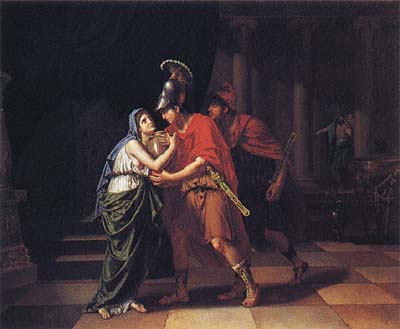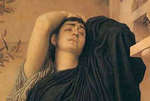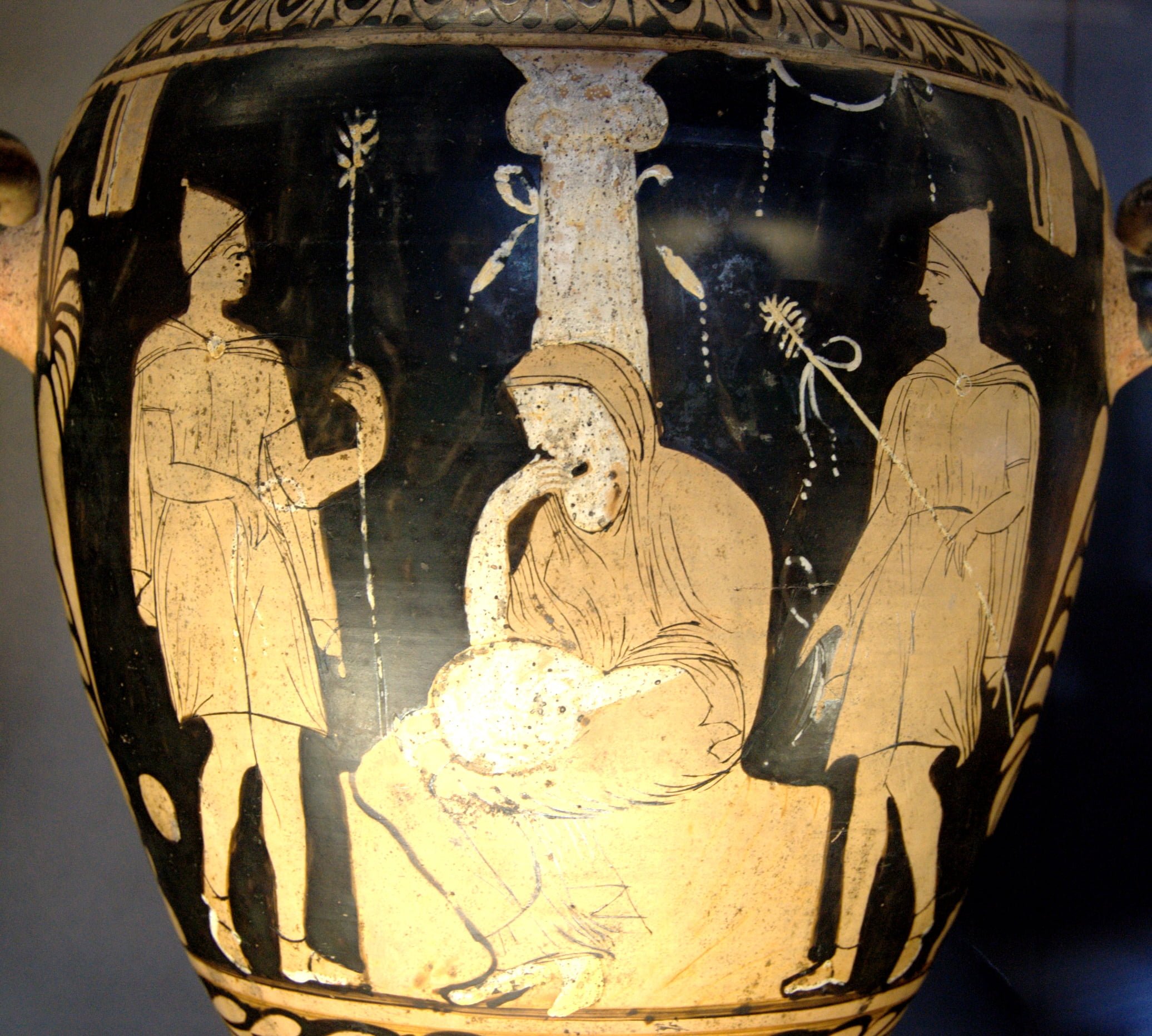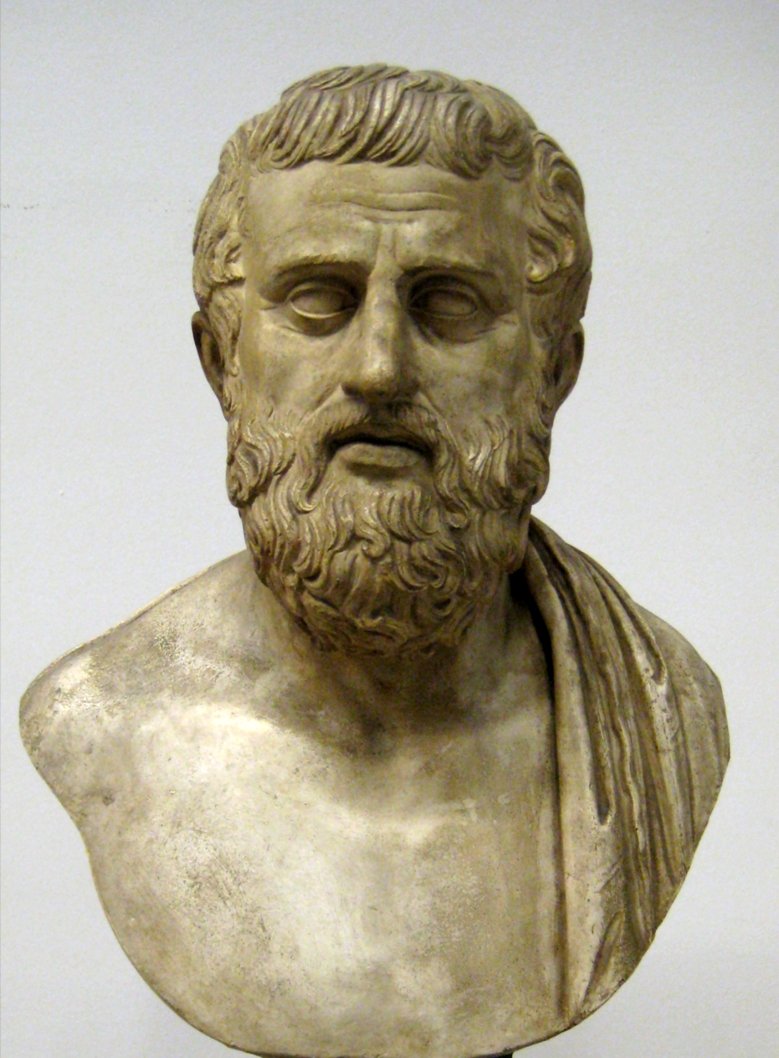
Electra
Electra by Sophocles
Written toward the end of Sophocles’ career, Electra dramatizes Orestes’ revenge for the murder of Agamemnon, just like Euripides’ same-titled play and Aeschylus’ Libation Bearers. It is set before the palace of Agamemnon at Mycenae, where, years after his mother had killed his father, Orestes returns at the beginning of the play with his faithful friend Pylades and his loyal tutor (the Pedagogue), to whom his sister Electra had entrusted him soon after the murder of Agamemnon. The three hide away after they hear a woman wailing from inside the palace. It is Electra, who subsequently walks out and proceeds to lament the sad state of affairs at the court: her dead father, her immoral mother, and, above all, her long-absent brother. It is evident that, unlike her sister Chrysothemis, Electra cannot bear the situation any longer, and for this, she is soon reprimanded by Clytemnestra. The pedagogue then enters with some sad news: he falsely reveals to Clytemnestra and Electra that Orestes has been killed at Delphi. Electra is inconsolable and vows to take revenge. After a while, under the guise of a Phocian messenger, Orestes himself enters the palace with an (empty) urn, claiming that it contains his very own ashes. The siblings don’t recognize each other at first, but after Electra takes the urn and delivers a lament over it, Orestes realizes the truth and reveals his identity to his sister. Now that Electra knows everything, a full plan of action is concocted, and soon after, Orestes and Pylades enter the palace and kill Clytemnestra. Aegisthus returns home to find out more about the “death” of Orestes, but, instead, under the sheet supposedly hiding his body, he finds the lifeless corpse of his wife. It is evident that the same fate awaits him as well. The play ends as he is being carried off stage to be murdered at the very same place Agamemnon had once been.
Date and Historical Background
The story of Orestes’ revenge was a popular subject in antiquity, but, even so, it is somewhat strange that three of the thirty-three surviving tragedies dramatize the very same events (especially when we take into consideration the fact that no more than 4% of all fifth-century plays have reached us). Sophocles’ Electra was certainly performed after Aeschylus’ Libation Bearers (458 BC), but it is not clear whether it was performed before or after Euripides’ Electra. In any case, it is highly likely that Sophocles’ and Euripides’ versions were written in close proximity to each other and, almost certainly, in the same decade. Most scholars agree that the decade in question is the penultimate of the fifth century (420-410).
Characters and Setting
Characters
• Pedagogue, attendant foster-father to Orestes
• Orestes, son of Agamemnon
• Pylades, a friend of Orestes
• Aegisthus, husband of Clytemnestra
• Clytemnestra, mother of Orestes
• Electra, sister of Orestes
• Chrysothemis, sister of Orestes
• Chorus of Argive Maidens.
Setting
The palace of Agamemnon at Mycenae.
Summary of Electra
Prologue
Before the palace of Agamemnon at Mycenae, three strangers arrive from a distant land. These are Orestes, son of Agamemnon, now twenty years of age; his faithful friend Pylades, son of King Strophius of Phocis, from whose court the three are now coming; and a Pedagogue, an old man who had been the tutor of the infant Orestes and who had secretly carried him away to Phocis soon after the murder of Agamemnon.
The three are here with a mission: to avenge the death of Agamemnon. However, since the Pythian oracle has advised Orestes to do this “alone, and by stealth, without the aid of arms or large numbers,” they are not allowed to use any kind of force just yet. So, Orestes has devised the following plan. First, the Pedagogue will enter the palace in the guise of a Phocian messenger sent by Phanoteus—the greatest of all allies of Clytemnestra and Aegisthus—and announce the death of Orestes. Afterward, Orestes and Pylades will arrive, bearing a funeral urn supposedly carrying the ashes of Orestes. Once inside, it will be easy for them to kill both Clytemnestra and Aegisthus. Thus, as the prince says, “by feigned death,” he should “find true life and win renown.”
A cry is heard from inside the palace and, advised by the Pedagogue, the three travelers hide from view. Electra comes out and, after greeting the sunlight, reveals her never-ending grief caused by the cruel murder of her father and the prolonged absence of brother. “O House of Hades and Persephone!” she exclaims, “come, help me, bring vengeance for the murder of my father and send me my brother. I no longer have the strength to hold up alone against the load of grief that crushes me.”
Parodos (Entrance Song)
At this point, the Chorus, composed of fifteen Argive maidens, enters the stage and expresses its sympathy with Electra. However, even though they abhor the deed that has caused her misfortune, they urge her to be more trusting in the gods and less angry with the rulers, for the latter is fruitless and the former, in time, can bring both Orestes and, with him, vengeance. If it doesn’t, replies Electra— that is, if the murderers don’t pay for the murder of her father—“then shame and reverence will vanish from all humanity.”
First Episode
“It is nevertheless with goodwill, like a true-hearted mother, that I dissuade you from begetting misery upon miseries,” say the Argive maidens to Electra. She replies with a long monologue in which she describes the extent of her sufferings: seeing, on a daily basis, Aegisthus in her father’s place; witnessing, year after year, Clytemnestra celebrating the death-day of her father with dance and joy; being unable to cry over Agamemnon’s fate before Clytemnestra; and, finally, being scolded by her for stealing Orestes from her hands and secretly sending him away. After finding out that Aegisthus is “in the country,” the Argive maidens allow themselves to be somewhat bolder and ask Electra does she know when Orestes would return. “He says he will come, but although he promises he never does what he says,” replies Electra.
At this moment, Electra’s sister Chrysothemis enters the stage, bearing funeral offerings. A bitter sisterly discussion follows, during which we find out that, though Chrysothemis feels annoyed with Aegisthus and Clytemnestra as well, she doesn’t think that Electra does anybody a favor by all this “vain indulgence in futile anger.” Hurt by her comments, Electra insults her back, and the Chorus has to intervene to stop a quarrel. “I wouldn’t have said anything,” Chrysothemis goes on, “if I had not heard that the greatest disaster is now rushing down on her, one which will restrain her from her long mourning.” Namely, soon after Aegisthus returns—unless she has learned to behave in the meantime—Electra is to be imprisoned in a dungeon. “That he may come, if he plans to do any of what you said,” Electra replies quite brutally, “so that I may fly as far as possible from you all.”
Finding her kindhearted counsels repelled, Chrysothemis proceeds on her errand, and we soon find out that, curiously enough, the funeral offerings she bears are intended for Agamemnon—and have been sent by none other than Clytemnestra. Apparently, she had had a dream in which Agamemnon returned to life and planted a scepter at the hearth; then a branch blossomed from the scepter and overshadowed the whole of Argos. Believing that this dream must have been sent by the gods, the now-delighted Electra persuades Chrysothemis to put locks of their hairs on Agamemnon’s grave instead of Clytemnestra’s impious offerings. Chrysothemis, touched, agrees to do so in secret and leaves.
In the first stasimon, incited by Clytemnestra’s dream, the Argive maidens predict vengeance, calling upon the Erinnyes and Agamemnon’s spirit.
Second Episode
Just like the first episode of Libation Bearers, the second episode of Electra is often (once again, mainly for convenience) divided into four separate scenes.
Electra and Clytemnestra
Followed by attendants bearing offerings for Apollo (whose alter stands just before the palace), Clytemnestra appears on stage and immediately starts a quarrel with Electra: “You run loose again, it seems, since Aegisthus is not here, who used to always keep you at least from coming out to the gates and shaming your family.” In the discussion which follows, Electra blames Clytemnestra for wickedness and impiety, while she justifies the murder of Agamemnon by stirring up memories of Iphigenia’s sacrifice. Electra replies that Agamemnon was incited to do that by Artemis, whereas she acted on her own free will. After Electra asserts her desire that Orestes might come back and avenge their father, Clytemnestra finally makes her offerings to Apollo and prays for release from her present fears.
The News from Phocis
Suddenly, the Pedagogue enters, disguised as a Phocian messenger sent by Phanoteus. He comes with some sad news: after proving his worth many times over at the Pythian games, Orestes tragically lost his life in the chariot-race. He brings the message; a few other men from Phocis should bring his ashes shortly. Clytemnestra is aggrieved for a second, but soon after, the grief evolves into a feeling of overflowing joy. She taunts Electra, who, hurt and distraught, invokes Nemesis, the goddess of vengeance, to take revenge for her brother’s death. Clytemnestra takes the messenger in the house, leaving Electra alone on the stage.
Kommos for Orestes
The third scene of the second episode is actually a kommos, a lyrical song of lamentation sang together by Electra and the Chorus. Though the Argive maidens try to comfort her, Electra is devastated and says that, for her, death cannot come soon enough. She is especially upset at the fact that the murderers of Agamemnon will escape unpunished: now that Orestes is dead, there is no man alive to avenge her father.
Electra's Vow
All of a sudden, Chrysothemis, “pursued by joy,” hurriedly enters the stage. “Dear sister,” she declares excitedly to Electra, “I bring joyful news to relieve your former troubles and grief: Orestes is with us. I have seen clear proofs.” On reaching the tomb of Agamemnon, she discovered that it has already been appropriately honored with libations, flowers, and a lock of hair. Can this be done by someone other than Orestes? Nothing else is possible, replies Electra, for Orestes is dead! The gifts must have been left at the tomb in his honor—but by someone else. After telling her this and reminding her that no man can avenge the death of their father now, Electra tries to persuade Chrysothemis to aid her in killing Aegisthus and Clytemnestra. Chrysothemis is too afraid to agree, so Electra resolves to do the deed herself.
In the second stasimon, the Chorus laments Chrysothemis’ timidity and celebrates Electra’s loyalty and courage: may she be awarded for these beautiful traits by the just gods!
Third Episode
As already announced by the Pedagogue, Orestes and Pylades arrive at the palace of Argos, carrying the urn supposedly filled with the ashes of Orestes. After questioning them of their whereabouts, Electra asks to take the urn into her hands. Then, she utters a lament so poignant and touching that Orestes immediately decides to reveal himself to her. “It is not proper for you to speak of Orestes as you do,” he says to her calmly, “for the living have no tomb.” “The man is alive?” asks Electra, taken aback. “If there is life in me.” As proof of his identity, Orestes shows Electra their father’s ring signet, and Electra is now so happy that Orestes has to restrain her.
He explains to her that she must keep her joy at bay, for it is crucial that his identity is kept a secret from Clytemnestra. The Pedagogue arrives and scolds both of them for their carelessness; at his advice, Orestes and Pylades enter the house, as does Electra after addressing a short prayer to Apollo.
Left alone, the Argive maidens sing a short ode (the third stasimon) in which they announce the arrival of the Erinnyes and the fact that the Avenger is currently being led by Hermes to his goal.
Exodos (Exit Song)
Not much time passes, and Electra rushes forth from the house and tells the Chorus that Orestes and Pylades are currently beside Clytemnestra and about to do the deed. Barely are these words out, and Clytemnestra’s pleas are heard outside: “My son, my son, have pity on your mother!” Silence follows, and Orestes and Pylades come out to confirm Clytemnestra’s death.
Just then, Aegisthus is seen approaching from the distance, and the two youths quickly reenter the palace. Electra welcomes Aegisthus, who immediately asks her if Orestes is truly dead. Electra confirms this and tells him that he can see the body himself if he likes. Aegisthus orders the palace doors to be open wide so that not only he, but the whole of Argos can see Orestes’ dead body.
And indeed, as soon as the doors are opened, a corpse, hidden by a veil, can be seen lying on a bier; on either side of it stand the two Phocian messengers who are supposed to have brought it. Aegisthus lifts the shroud only to see the body of his beloved wife. He immediately guesses that Orestes stands before him and that he is about to be murdered himself. As Orestes takes Aegisthus inside the palace to kill him at the very spot where his father had once been slain, the Argive maidens express their joy that the Gouse of Atreus has finally found some peace.
A Brief Analysis
Although it is unlikely that we will ever discover whose Electra came first—Sophocles’ or Euripides’—they both seem to benefit from comparative analysis (to both Aeschylus’ Libation Bearers and between them), especially in terms of the characterization of the main protagonists: Clytemnestra, Electra, and Orestes.
In Aeschylus, despite the title, Clytemnestra seems to dominate Oresteia, the whole trilogy of which Libation Bearers is part of (even though she is dead by the end of the second play). In Euripides, the enfant terrible of Ancient Greek theater, it is all about Electra, who daringly blurs the lines between the masculine and the feminine as understood in the ancient world, by being not only an intelligent woman but also an actual agent in the events that unfold.
As often, Sophocles’ restraint and balance in characterization places him somewhere in the middle between these two extremes. In his Electra, Clytemnestra is portrayed as weak and feeble: she is unable to control her daughter and, as indicated here and there, is entirely subservient to her husband, Aegisthus. Unsurprisingly, the order of the murders at the end of the play is reversed in comparison to Aeschylus’ tragedy: the culmination is not the death of Clytemnestra, but the death of Aegisthus.
Orestes is depicted as pretty smart, bold, and in control of the situation. He is not only the one who devises the plan from scratch, but he is also much more resolute and much less unafraid of the deed than Aeschylus’ Orestes. Also, Sophocles’ Orestes stoically manages to endure Electra’s lament for him as much as possible, and, even though touched to the core, only carefully and cautiously reveals his identity to her afterward.
Finally, though much more three-dimensional than Aeschylus’ Electra, Sophocles’ Electra is still not as independent and as complete as Euripides’. In fact, Sophocles seems to define her only in relation to the death of her father, her only desire being revenge even after she hears the news of Orestes’ (false) death. This is so manifest in her character that Carl Jung decided to name the feminine version of the much more famous Oedipal complex Electra complex. Ian Storey and Arlene Allan are right to pose the question: “Does this Electra have anything to live for once the murders are done?” Based on her actions in the play, the answer seems decidedly negative.
Sources
There are many translations of Oedipus Rex available online, both in verse and in prose; if you are a fan of the latter, you can read Richard Claverhouse Jebb’s translation for Cambridge University Press here. If, however, you prefer poetry, feel free to delve into E. H. Plumptre’s blank verse adaptation here.
See Also: Orestes, Electra, Sophocles, Libation Bearers
Electra Video
Link/Cite Electra Page
Written by: The Editors of GreekMythology.com. GreekMythology.com editors write, review and revise subject areas in which they have extensive knowledge based on their working experience or advanced studies.
For MLA style citation use: GreekMythology.com, The Editors of Website. "Electra". GreekMythology.com Website, 09 Apr. 2021, https://www.greekmythology.com/Plays/Sophocles/Electra/electra.html. Accessed 26 April 2024.





